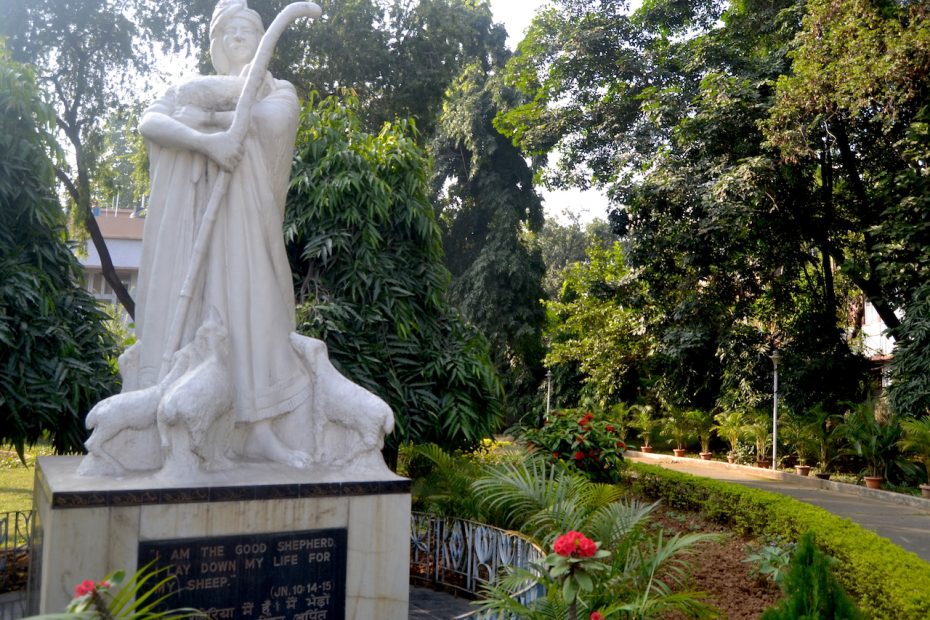Adivasi shepherd statue at the Archbishop’s house in Ranchi
RAOEN shares this 2019 Ecojesuit interview with Archbishop Felix Toppo SJ, Archdiocese of Ranchi in India where he shared about the challenges of Adivasis, the tribals in Bagdogra, as State-backed corporations force them out of their natural resource-rich lands. Families who migrate to the city face marginalization, a diminishing sense of cultural identity, and a waning sense of hope among the youth. The effort, according to Archbishop Toppo, is to accompany the youth in deepening their sense of community and connectedness with the land, and in turn communicate this to broader society with a sense of hope.
For Indigenous Peoples of India, known as tribals or Adivasis, titles do not only hold the name of their family, but are also the ties that bind them to the land.
For example, Archbishop Felix Toppo SJ of the Archdiocese of Ranchi shared that his name toppo is the name of a nightingale. Titles of totemic Adivasi tribes like his translate to different species of animals that each clan protects from extinction.
Sadly, according to the archbishop, many tribal families who migrated to the city have forgotten what their names mean, as well as other aspects of their culture.
“I go here and there to say mass and then I’ll ask people their names. I’ll ask them what their title means. In the village area, they know, but in the city area, they don’t. For us tribals, the title is a very important thing,” he lamented.
“I sometimes scold the parents for not teaching it to their children,” he added.
However, they cannot really be blamed, the archbishop noted, as the loss of certain aspects of culture in the urban setting is only a symptom of a much bigger problem.
Uprooted from the land
Adivasis occupy lands that are rich in forest, mineral, agricultural, and other biotic resources that they sustain through their culture rooted in the environment. Due to this ecological wealth, state-backed corporations, dating from the British occupation and until today, have taken interest in tribal lands for extensive resource extraction guised as development projects.
“The government wants to bring lots of corporations to start industries. What will happen is they will destroy the beauty of the land and the forests – and they have already started doing that. They will destroy the entire ecology of the state. That is a big danger. Water sources are polluted. More people are displaced,” Archbishop Toppo said.
In the city, Adivasis are further marginalized, economically and socially. They who used to sustain the land that sustained them have become part of the growing population of urban poor. Excluded from basic social services and deemed primitive and backwards by dominant society, their priorities have shifted away from the culture and more towards daily survival.
The archbishop said this has taken a toll on the sense of hope of young Adivasis for their future.
“They are under great pressure. On one hand, they know that they have to be educated to be skilled or professionals to get jobs. But at they same time, they see that there is no hope for them to get good jobs because jobs are being curtailed now. Many jobs, even in the government, are laying off employees. So they are actually very disturbed and they have no time to think about ecology,” he said.
Sowing hope through education
This is mainly the difficulty that the Loyola Training Centre (LTC) in Ranchi aims to address. The center was established in 1972 to accompany urban youth, many of whom are Adivasis, in acquiring jobs in the city. It started as a simple coaching center for takers of the national competitive examinations, a requirement for employment, and also provided training for in-demand skills such as typing, shorthand, and spoken English.
Today, the centre, operated by Jesuits in Ranchi, also offers classes in computer skills, mathematics, banking, and provides study spaces for youth who are preparing for their exams but lack proper facilities at home. Around a thousand students are accommodated in different programs of the center.
While the training centre has helped a lot in equipping the youth to acquire jobs in the city, the greater challenge, according to LTC director Mark Mukul SJ, is to unite the Adivasi youth in the center and make them aware of the issues faced by their culture as well as their rights as tribal people.
“What we need to do is to accompany the youth. And it is not being done well in families and even the church,” Father Mukul said. Due to the pressure for employment and individual achievement in the urban areas, most of the youth in the city have lost interest in their culture and their sense of community.
“What has happened is, those who moved to the cities, they don’t go back to their villages, and therefore there is no leadership in communities. So we are trying to bring together, not only the youth, but also those who have retired from their jobs in the city,” he added.
The LTC director also said they are now aiming to introduce more programs that would encourage the youth to find opportunities within their communities, such as organic farming.
“It will take time, because the youth are used to city life,” he said, emphasizing the need for broader dialogue and greater collaboration with different institutions, not just in the education sector, in order to address the situation.
“It is very complex, but we have to start somewhere,” he added.
Small steps
Archbishop Toppo admits the archdiocese may not have done much yet to facilitate this dialogue in society to encourage a deeper sense of community and connectedness to the land, but for now, small steps are being taken to start the conversation.
“When Laudato Si’ came, we studied it and held seminars for priests, brothers and seminarians. We also shared it to (non-Catholics) because the message (of the encyclical) is not confined to religion,” he said.
The archbishop said they also held a youth convention in Gumla where part of the discussion focused on ecology to spread awareness on current environmental issues. Planting activities are also initiated in partnership with village parishes as part of the effort. Still, he believes a lot is yet to be done.
“We have not yet actually planned what we have to do in the long run. We need to collaborate with those who are already doing their part, like the Jesuits are doing,” he said. The Archdiocese recently started connecting with Ecojesuit, a global network on reconciliation with creation that collaborates with other religious congregations, faith-based organizations, the scientific community, civil society, and Indigenous Peoples towards the common good.
“We have to educate people more broadly about the importance of ecology, because if we destroy nature, we also destroy ourselves and endanger the future of the whole human race,” he added.


